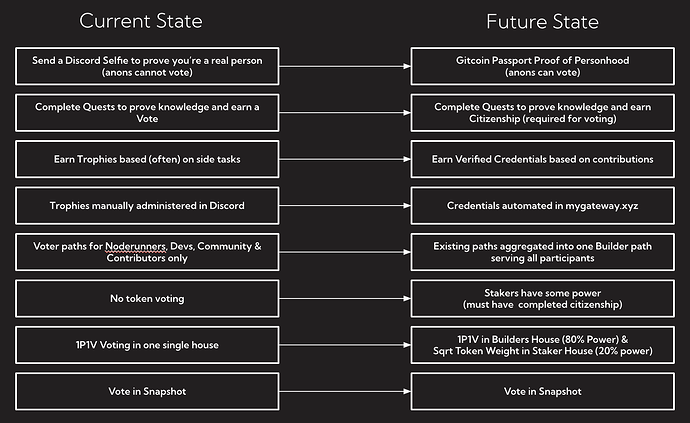hey Steve, it’s really important to clarify for OG voters the big opportunities here so I appreciate you jumping in with these questions.
Just to clarify, there is nothing to “go through” again. As an existing DAO voter you are vouched into the new system and your governance power is enshrined for a minimum of 12 months. The upgrade makes explicit that by writing a proposal, winning an RFP, shipping a PR or multiple other ways that you can continue to maintain that power, but we intend to iterate with other ways that people like you who are highly knowledgeable and deeply care about POKT can maintain their vote. I am sure we will find the right balance on this.
Now is the time to address our current challenges though. Our governance system has ossified around these existing personas to a point where no one new can get governance power. We have people who have exited the network who are no longer high context and who do not care deeply about POKT’s long term success. And someone like Raidguild who built the wPOKT bridge and are currently building a gateway cannot get a vote because we do not have a “bridge building” or “gateway building” quest. This is untenable and not befitting a tier 1 project. The main change here then is to enfranchise people who are undoubtedly investing in making POKT a success and keeping them focused on shipping and it is not about forcing people to stay continually engaged.
The substantive changes to the constitution are the inclusion of the parameters and powers of the new governance system as set out in Powers and Parameters sections. Other changes can best be described as:
If you think there are substantive changes that need further discussion please outline them here so they can be clarified publicly for everyone to stay fully informed.
As I shared with Cryptocorn, none of these is excluded from being debated or activated in future. This proposal sets the foundation for creating a modular and adaptive governance model that can continue to be calibrated and improved after these important foundations are set. It’s also important to note that the proposal creates a backbone infrastructure that would be needed to enact the system Cryptocorn advocates for. So a vote for CREDS is a first step towards this type of model anyway.
We want everyone to have what they need to make an informed decision. We have been discussing this since last November in multiple posts around the technical specifications, and have hosted community calls and twitters spaces with partners around the goals, design and any trade offs. We’re willing to move heaven and earth to answer anything that is still unclear with people here in this thread, on the weekly office hours, or directly in 1-to-1’s to try to get this out for a vote next week. If anyone has unexpressed concerns or needs more information now’s the time to share!
